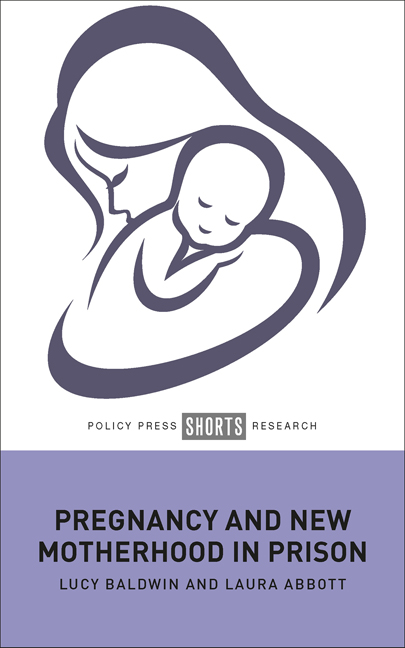Book contents
- Frontmatter
- Dedication
- Contents
- Acknowledgements
- ONE Context and landscape of pregnancy and new motherhood in prison
- TWO How we came to be here: 100 years of criminalised motherhood
- THREE The ‘journey’ to incarcerated motherhood
- FOUR Motherhood confined
- FIVE The persisting pain of incarcerated pregnancy and new motherhood
- SIX Personal experiences of pregnancy and motherhood in prison and the value of the voluntary sector in challenging the system
- SEVEN ‘Learning lessons’: discussion, concluding thoughts and recommendations
- Notes
- References
- Index
ONE - Context and landscape of pregnancy and new motherhood in prison
Published online by Cambridge University Press: 03 April 2024
- Frontmatter
- Dedication
- Contents
- Acknowledgements
- ONE Context and landscape of pregnancy and new motherhood in prison
- TWO How we came to be here: 100 years of criminalised motherhood
- THREE The ‘journey’ to incarcerated motherhood
- FOUR Motherhood confined
- FIVE The persisting pain of incarcerated pregnancy and new motherhood
- SIX Personal experiences of pregnancy and motherhood in prison and the value of the voluntary sector in challenging the system
- SEVEN ‘Learning lessons’: discussion, concluding thoughts and recommendations
- Notes
- References
- Index
Summary
‘My Brooke was beautiful, my daughter should be here now, I was let down, and my daughter was let down by the people who were meant to look after us.’
Louise Powell, 2022Introduction
This introductory chapter will open the conversation around pregnancy and new motherhood in prison. Having provided the context and explored the mother and baby unit (MBU) application process, the chapter will bring to the fore some of the tragic losses that have underpinned the drive for improvement in the care of pregnant and new mothers in prison. The chapter will then highlight our underpinning research and will make clear our position as researchers and practitioners.
In March 2019 both authors, together with women who have lived experience, other academics and practitioners, including from the Royal College of Midwives and the charities Birth Companions and Children Heard and Seen, gave televised evidence to the Joint Human Rights Committee (JHRC). Despite the lifelong implications of separation, or the trauma of being pregnant in prison, until recently very little was known about the experiences of women in such circumstances, particularly women from ethnic minority backgrounds. Pregnancy and imprisonment is a topic that has recently begun garnering interest. The subject had previously not enjoyed a particularly high profile, politically, academically or in terms of public interest. However, in more recent times the excellent work and campaigning of charities like Birth Companions and Women in Prison, and important publications of the authors and others (Raikes and Lockwood, 2011; Galloway et al, 2014; O’Keefe and Dixon, 2015; Baldwin and Epstein, 2017; Dolan et al, 2019; Minson, 2020; Baldwin, 2022a, 2022b; Epstein et al, 2022), has shone light on the experiences of imprisoned mothers and babies. Consequently, the experiences and needs of this previously largely invisible population are now being discussed and, importantly, being considered in prison policy development and practice. Significantly, with a view to effecting meaningful change for the first time in many decades, not least via the Ministry of Justice’s Review of Operational Policy on Pregnancy, Mother and Baby Units and Maternal Separation published in July 2022.
- Type
- Chapter
- Information
- Pregnancy and New Motherhood in Prison , pp. 1 - 23Publisher: Bristol University PressPrint publication year: 2023

